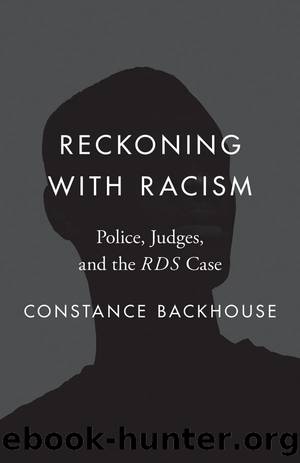Reckoning with Racism: Police, Judges, and the RDS Case by Backhouse Constance;

Author:Backhouse, Constance;
Language: eng
Format: epub, pdf
Publisher: University of British Columbia Press
Published: 2022-06-15T00:00:00+00:00
12
Epilogue
The Witnesses
Rodney Smallâs first arrest was not his last. Rocky Jones warned him the police would be on the lookout and to steer clear of trouble. But the initial court reversals took a toll on the teenager. He admitted he âstarted to get involved with things I shouldnât have.â In 1995, he pleaded guilty to drug trafficking and served two months in the Waterville youth correction facility. An after-school altercation with a student who called him the N-word resulted in another arrest. Then he dropped out of school.1
As he had threatened to do, Small left home before the final ruling and only heard about the decision en route to Toronto.2 He returned in time to be feted at a victory party at Rocky Jonesâs home. Years later, he teared up when he remembered the celebration. âRockyâs family accepted me just like family. Joan and Sharon and all of his kids were all there. I knew I was a part of something bigger than just me.â3
With the help of renewed religious faith, sympathetic teachers, and student support workers, he completed Grade 12 at Queen Elizabeth High and a bachelor of management degree from Dalhousie. An internship at the Black Business Initiative led him to cofound Common Good Solutions, an award-winning social enterprise service assisting young people to start new businesses.4 The 5557 Cunard Street office had earlier housed Rocky Jonesâs law office and a community day-care that Rodney attended in his childhood. He volunteered with the 7th Step Society, an organization helping ex-offenders. He supported the Black Lives Matter movement in the wake of the police murder of George Floyd in Minneapolis in 2020, describing the traumatic video as devastating.5 He protested gentrificationâs displacement of North End Blacks, a reminder of the forced destruction of Africville.6
Rodney Small beside Burnley (Rocky) Jonesâs portrait, Dalhousie Law School, 2018. Reflecting on the turn around, Small added, âOne thing I can tell you is statistically Iâm not supposed to be where I am today. [M]any young men that I grew up with are either doing life in prison, or are six feet under the ground.â7 Crediting Jones, he mused: âMan, he was special. When I got convicted on drug charges, Rocky was still, âDonât give up young fellow, thereâs more to you. Thereâs something about you.ââ8 He felt similarly toward Judge Sparks. One of his proudest moments was hearing her speak at a Dalhousie law school event. Afterwards, he posed for a photograph with her beside a portrait of the late Rocky Jones.9
Donald Stienburg, the arresting officer, enrolled part-time at Dalhousie on top of his police shifts, then took a full semester away from the force between the trial and the final decision. He completed his science degree in 1996. His work ethic stood him in good stead in his career and he was promoted to staff sergeant. Decades later, he emphasized that he âharboured no ill will against Judge Sparks.â
I would think a little differently now than then. The Supreme Court judges said her
Download
Reckoning with Racism: Police, Judges, and the RDS Case by Backhouse Constance;.pdf
This site does not store any files on its server. We only index and link to content provided by other sites. Please contact the content providers to delete copyright contents if any and email us, we'll remove relevant links or contents immediately.
The Borden Murders by Sarah Miller(4013)
The Secret Barrister by The Secret Barrister(3419)
Coroner's Journal by Louis Cataldie(2357)
Police Exams Prep 2018-2019 by Kaplan Test Prep(2355)
The Splendid and the Vile by Erik Larson(2225)
Terrorist Cop by Mordecai Dzikansky & ROBERT SLATER(1962)
My Dark Places by James Ellroy(1802)
A Colony in a Nation by Chris Hayes(1796)
Black Klansman by Ron Stallworth(1698)
The Art of Flight by unknow(1692)
A Life of Crime by Harry Ognall(1596)
Objection! by Nancy Grace(1567)
The New Jim Crow by Michelle Alexander(1547)
Whoever Fights Monsters by Robert K. Ressler(1534)
Anatomy of Injustice by Raymond Bonner(1525)
Invisible Women by Caroline Criado Perez;(1516)
Obsession (The Volkov Mafia Series Book 1) by S.E Foster(1493)
American Prison by Shane Bauer(1479)
A is for Arsenic: The Poisons of Agatha Christie (Bloomsbury Sigma) by Kathryn Harkup(1454)
